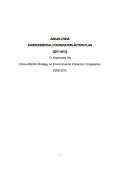
ASEAN-CHINA Environmental Cooperation Action Plan focuses on the cooperation between China and southeast Asian countries and facilitates the implementation of the China and ASEAN Leader's initiative to achieve the UN Millenium Development Goals, poverty reduction, and green development. The action plan aims to promote and facilitate the implementation of the China-ASEAN strategy on environmental cooperation and the ASEAN and China Leader's initiatives.
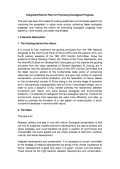
The communist party of China (CPC) central committee and the state council, on September 21 published a reform plan Integrated Reform Plan for Promoting Ecological Progress . It was formulated with an aim to develop a systematic and complete system to improve the ecosystem and accelerate the environmental protection. The idea is to integrate development with conservation.
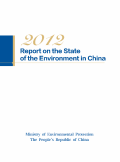
The Report on the State of the Environment in China states the progress China has made in terms of environmental policies, legislation, science and technology, and monitoring systems. It explains that the strengthening of environmental policies has led to significant emission and pollution reductions as well as the strengthening of nuclear and radiation safety measures.
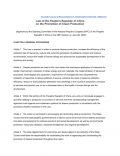
Formulated to promote cleaner production and increase resource efficiency the Law of the People's Republic of China on the Promotion of Clean Production was approved by the standing committee of the National People's Congress (NPC) on 29th of June, 2002. The aim of this law is to promote scientific research, technical development, and international cooperation in order to develop cleaner production and to organize the dissemination of information in order to promote more environmentally friendly production technologies.
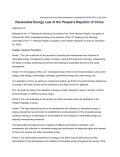
Renewable Energy Law of the People's Republic of China was adopted on 28th February 2005 and was amended on December 26th, 2009. The law was formulated to promote the development and utilization of renewable energy, to increase the supply of energy and to protect the environment in order to realize sustainable development. The renewable energy here refers to non-fossil energies, such as wind energy, solar energy, hydro energy, bioenergy, geothermal energy, and ocean energy.
